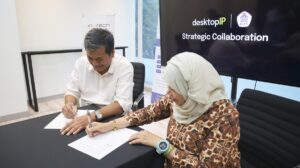Heaptalk, Jakarta — Indonesia-based IT company, DesktopIP, has officially entered into a strategic collaboration with the National Institute of Science and Technology (ISTN). The signing of the Memorandum of Understanding (MoU), conducted by DesktopIP’s Chief Executive Officer, Phidi Soepangkat, and Vice Rector of Resources at ISTN, Dr. Rivira Yuana, S.T., M.T., marks a significant milestone in fostering synergy between the academic and industrial sectors to optimize the Archipelago’s technological and human capital.
This collaboration aims to enhance Research and Development (R&D) activities by establishing collaborative platforms that enable students and lecturers to contribute actively to the advancement of future technologies. Through this synergy, the partnership aims to produce innovative products that are not only globally competitive but also deliver tangible societal benefits.
Nevertheless, Indonesia’s R&D ecosystem continues to grapple with several structural challenges. Data from ReportLinker reveals that the R&D expenditure in the Prabowo-led country has remained at a mere 0.34% of its Gross Domestic Product (GDP) over the past two years—substantially lower than other SEA countries, such as Singapore (2.0%), Thailand (1.33%), and Malaysia (1.0%). The disparity is further exacerbated by the persistent disconnect between academic institutions and industry players, as well as a prevalent risk-averse attitude toward innovation, which significantly impedes the advancement of local technological development.
Responding to the matter, CEO Phidi Soepangkat conveyed, “The R&D ecosystem in Indonesia is still entrenched in a mindset that is not fully conducive to innovation. Many stakeholders remain hesitant in the face of uncertainty, without accounting for its long-term implications. In reality, innovation demands the courage to explore uncharted territories—it is not merely a question of investment magnitude,” he remarked during the MoU signing ceremony. (04/22)
To bridge this gap, this strategic measure is designed to cultivate a cohesive innovation ecosystem that can drive comprehensive national technology development. Its scope spans the entire technological spectrum, from foundational elements such as operating systems to application-level solutions.
Armed with a clearly defined and field-tested technological roadmap, the partnership aims to merge academic theoretical frameworks with practical industrial experience. The initiative is not solely focused on developing finished products, but instead on delivering commercially viable technological solutions that prioritize continuous innovation and contribute to enhancing national human capital.

“ISTN, with its long-standing academic legacy, recognizes the imperative to evolve into an adaptive institution. Competing in the manufacturing technology domain poses inherent limitations for Indonesia. For this reason, transitioning to the digital arena, particularly in virtualization technology, is a strategic inevitability. In this context, DesktopIP has established itself as a frontrunner in the field, positioning this collaboration as a pivotal opportunity for ISTN to emerge as a premier research and development hub,” asserted Vice Rector Rivira Yuana.
Over the next one to three years, the collaboration aims to establish a dedicated technology research center that will produce outcomes defined by two key metrics: relevance to domestic market needs and compliance with international quality standards.
ISTN will also serve as a primary partner in mapping, documenting, and academically validating DesktopIP’s research initiatives, while simultaneously facilitating the integration of young talent through industry-driven educational programs. All outputs generated through this partnership will be commercialized via the Aplikadia platform, ensuring that each innovation achieves not only technical maturity but also measurable economic impact.
“DesktopIP holds a unique position in developing Indonesia’s core technologies, particularly in critical yet often overlooked domains such as operating systems and virtualization. With an integrated, end-to-end solution ecosystem that is fully validated and free from external dependencies, we believe this partnership will unlock exponential growth opportunities for the national tech industry,” concluded Ashari Abidin S.T., M.T., Head of ISTN’s Informatics Engineering Program.











